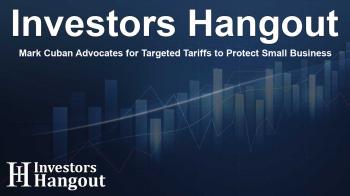Mark Cuban Advocates for Targeted Tariffs to Protect Small Business

Mark Cuban's Take on Tariffs
Billionaire investor Mark Cuban publicly expressed his support for targeted tariffs aimed at protecting specific strategic industries while denouncing blanket tariffs. He emphasizes that such broad measures could harm small businesses, a concern he shared in recent posts on social media.
Cuban's View on Strategic versus Blanket Tariffs
Cuban articulated his position, stating, "I support tariffs that protect our strategic industries." He further explained that blanket tariffs can have detrimental effects, particularly on small businesses which often struggle under such economic pressures. This nuanced perspective highlights the complexities involved in formulating effective trade policies.
Strategic Tariffs Make Sense
Cuban called for precision in trade policy, arguing that tariffs should be carefully assigned to enhance industry security rather than applied broadly without consideration. His critique of blanket tariffs being "idiotic" reflects a growing debate regarding current trade strategies affecting key sectors, notably semiconductor manufacturers.
Recent Industry Developments
In related discussions, Cuban previously praised President Trump's agreement with Nvidia Corp. NVDA and Advanced Micro Devices Inc. AMD regarding exports to China. He described this deal as a smart move in protecting domestic interests, suggesting it embodied elements of a "billionaire’s tax" that some politicians have long sought to implement.
Impacts of Tariff Policies
Consumer and market reactions to emerging tariff policies are significant. Analysts from Goldman Sachs predict that the burden on consumers from tariffs could escalate considerably. Projections estimate an increase from 22% in June to 67% in the following months. Furthermore, Oxford Economics foresees U.S. tariff rates potentially surpassing 18%, which would be the highest since the 1930s.
Focus on Small Businesses
Cuban pointed out the inadequacies in the current administration's approach to assessing the impact of tariffs on small businesses, highlighting it as a critical issue that demands resolution. This concern isn't isolated; many investors are expressing anxiety over the repercussions of current trade policies on various industry segments.
Market Reactions and Perspectives
Market sentiments have been varied. Investor Kevin O’Leary criticized the Nvidia and AMD agreement, labeling it as a form of blackmail, while economist Steve Eisman labeled Trump’s tariff strategy as commendable, referring to it as an effort to rectify oversights from previous administrations. Interestingly, the SPDR Gold Trust GLD witnessed a modest increase following Trump's decision to exempt gold from the latest tariff considerations.
Challenges in Manufacturing Jobs
Concerns about the labor market remain high, with economists from Wells Fargo cautioning that significant increases in manufacturing jobs are unlikely despite the potential benefits from tariff protections. The current labor shortage complicates the landscape, with shortages surpassing 14 million workers.
Conclusion on Tariff Strategies
As discussions around tariffs and trade policies continue, it is clear that the impacts on small businesses and specific industries are crucial to consider. Cuban's advocacy for targeted tariffs invites further dialogue about how best to balance protectionism with the needs of broader economic health.
Frequently Asked Questions
Why does Mark Cuban support targeted tariffs?
Cuban believes targeted tariffs help protect strategic industries, whereas blanket tariffs negatively impact small businesses.
What are the potential consumer impacts of tariffs?
Economic analysts project that the consumer burden from tariffs could rise significantly, affecting overall spending and business operations.
How does Cuban view the Nvidia and AMD deal?
Cuban sees the deal as a successful protective measure and indicative of strategic tariff implementation that aligns with his views.
Why are small businesses affected by blanket tariffs?
Small businesses typically lack the resources to absorb the costs associated with blanket tariffs, which can lead to financial strain or closures.
What do economists say about future manufacturing job growth?
Many economists remain skeptical about substantial job growth in manufacturing as labor shortages continue to pose challenges for the industry.
About The Author
Contact Olivia Taylor privately here. Or send an email with ATTN: Olivia Taylor as the subject to contact@investorshangout.com.
About Investors Hangout
Investors Hangout is a leading online stock forum for financial discussion and learning, offering a wide range of free tools and resources. It draws in traders of all levels, who exchange market knowledge, investigate trading tactics, and keep an eye on industry developments in real time. Featuring financial articles, stock message boards, quotes, charts, company profiles, and live news updates. Through cooperative learning and a wealth of informational resources, it helps users from novices creating their first portfolios to experts honing their techniques. Join Investors Hangout today: https://investorshangout.com/
The content of this article is based on factual, publicly available information and does not represent legal, financial, or investment advice. Investors Hangout does not offer financial advice, and the author is not a licensed financial advisor. Consult a qualified advisor before making any financial or investment decisions based on this article. This article should not be considered advice to purchase, sell, or hold any securities or other investments. If any of the material provided here is inaccurate, please contact us for corrections.

